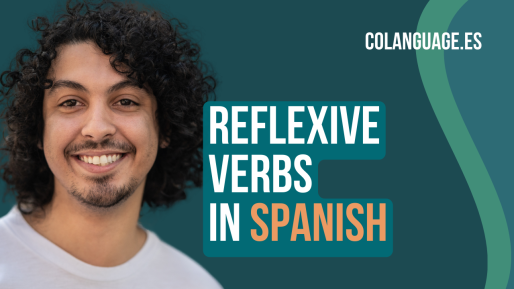Prepositions in Spanish (in, on, to, for,...) Share Copied!
Spanish Seasons, months and parts of the year A1 From hours to seasons
Hi and welcome! In this lesson, we are going to learn the prepositions in Spanish.
<< Estaciones, meses y partes del año. (Seasons, months and parts of the year)
Video
Podcast
What are prepositions?
Prepositions help us make sense of how things relate to each other in a sentence. They are like little helpers that give us extra information.
Think of prepositions as words that help us understand where things are, when things happen, how things are done, and more. They are usually complementing a noun or pronoun in a sentence.
- Este regalo es para ti (This gift is for you)
-
Estamos en el parque (We are at the park)
-
Voy a estudiar por la tarde (I am going to study in the afternoon)
Prepositions "a" and "al"
The preposition "a" can be translated in English as "to", "at", "on", "in".
| Use cases of "a" | Spanish | English |
|---|---|---|
| Indicating movement towards a specific place or person | Voy a la tienda. | I'm going to the store. |
| Indicating a point in time | Nos vemos a las tres. | See you at three. |
| Expressing the means or manner of doing something | Viajamos a pie. | We traveled on foot. |
In combination with other words the meaning can change.
Lloró a causa del dolor. (She cried because of the pain.)
This preposition has to be combined with an article in some cases. This is called contraction.
| Forming the contraction "al" | Spanish | English |
| a + el al | Vamos al cine esta noche. | We are going to the cinema tonight. |
Sometimes, we need to combine the preposition "a" and the article "el" to form "al".
Prepositions "de" and "del"
The preposition "de" often translates to "of", "from" or "about" in English.
| Use cases of "de" | Spanish | English |
|---|---|---|
| Expressing origin | Ella es de Francia. | She is from France. |
| Showing what something contains inside | Una taza de café. | A cup of coffee. |
| Indicating possession | El coche de mi hermano. | My brother's car. |
In specific cases we have to combine the preposition with the article, which forms a contraction.
| Forming the contraction "del" | Spanish | English |
| de + el del | El sabor del chocolate es delicioso. | The taste of chocolate is delicious. |
The preposition "de" can be combined with the article "el" to form the contraction "del".
Preposition "en"
The preposition "en" most often translates to "in" in English, but can also translate as "on" or "at".
| Use cases | Spanish | English |
|---|---|---|
| Express the means or manner of doing something | Ella habla en voz baja. | She speaks in a low voice. |
| Indicate the position of something | Hay una mancha en la pared. | There is a stain on the wall. |
| Indicate location | Estoy en casa. | I am at home. |
| Express time | En 2006 hice un viaje increíble. | In 2006 I took an incredible trip. |
| Expressing duration | Llego en dos horas. | I arrive in two hours. |
Preposition "por"
In Spanish, there are two prepositions that translate to "for" in English. Each preposition serves a different purpose and can be used in different contexts.
The preposition "por" can also translate in English to "by", "below", "in front of", "on".
| Use cases | Spanish | English |
|---|---|---|
| Indicate movement through a place | Ayer pasé por tu casa. | Yesterday I passed by your house. |
| To show movement | El autobús pasó por delante de mí. | The bus passed in front of me. |
| To show movement | El avión voló por debajo de las nubes. | The airplane flew below the clouds. |
| Indicate an exchange of something | Lo compré por diez euros. | I bought it for ten euros. |
| Express time | Viví en Madrid por cinco años. | I lived in Madrid for five years. |
| It can be used to express the reason or motive | Lo hago por ti. | I do it for you. |
| To talk about how something is done | Me enteré por la radio. | I found out on the radio. |
The preposition "por" can be combined with other words and prepositions to create new meanings.
Preposition "para"
The preposition "para" is the second way of saying "for" in Spanish. It can also translate in English as "to" or "in order to" when combined with an infinitive.
| Use cases | Spanish | English |
|---|---|---|
| To talk about a destination, purpose or a person | Compré flores para mi madre. | I bought flowers for my mother. |
| To express time, deadlines or goals | La tarea es para mañana. | The task is for tomorrow. |
| Meaning "to" when combined with infinitive form of the verb | Me levanto temprano para hacer ejercicio. | I wake up early to workout. |
Note that you cannot end a sentence in Spanish with a preposition like you can in English.
¿Para qué estás ahorrando dinero? (What are you saving money for?)
Preposition "con"
The Spanish preposition "con" translates to "with" in English.
| Spanish | English |
|---|---|
| Voy al cine con mis amigos. | I'm going to the movies with my friends. |
| Preparé la cena con mucho cuidado. | I prepared dinner with great care. |
| Estoy estudiando español con un profesor particular. | I am studying Spanish with a private teacher. |
The preposition "con" is used to show the connection or relationship between two or more things.
Preposition "desde"
The preposition "desde" is commonly translated as "since" or "from" in English.
| Spanish | English |
|---|---|
| He vivido en esta ciudad desde 2010. | I have lived in this city since 2010. |
| Desde que era niño, siempre me ha gustado la música. | Since I was a child, I have always liked music. |
| Trabajo en esta empresa desde el año pasado. | I have been working at this company since last year. |
In Spanish, this preposition is used to indicate the starting point of an action or a period of time.
Preposition "hacia"
The preposition "hacia" is translated in English as "towards".
| Spanish | English |
|---|---|
| El tren se dirige hacia la estación central. | The train is heading towards the central station. |
| El avión volará hacia el sur. | The plane will fly towards the south. |
| El perro corre hacia su dueño. | The dog runs towards its owner. |
This preposition shows the direction or movement towards a specific point, destination, or goal.
Preposition "sobre"
The preopositon "sobre" translates to "on", "over", "above" or "about".
| Spanish | English |
|---|---|
| El pájaro volaba sobre las nubes. | The bird was flying over the clouds. |
| Tenemos que hablar sobre el proyecto. | We need to talk about the project. |
| Hay un libro sobre la mesa. | There is a book on the table. |
Preposition "hasta"
The Spanish preposition "hasta" translates to "until" or "up to".
| Spanish | English |
|---|---|
| No comeré nada hasta que vuelva del trabajo. | I won't eat anything until I come back from work. |
| Esperé hasta tarde. | I waited until late. |
| El gato saltó hasta el tejado. | The cat jumped up to the roof. |
We use it to indicate a limit, endpoint, or duration.
Key takeaways
Here is a quick summary of this lesson.
- Prepositions help us make sense of how things relate to each other in a sentence.
- They are usually complementing a noun or pronoun in a sentence.
- The preposition "a" can be combined with the article "el" to form the contraction "al".
- The preposition "de" can be combined with the article "el" to form the contraction "del".
Subscribe to our social media channels to get free daily exercises!



